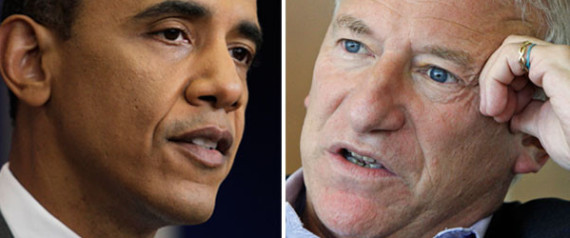 WASHINGTON -- The debt ceiling bill set to be voted upon Monday evening has left labor advocates in yet another precarious -- and deeply frustrated -- position. A president who began his term with the promise to not only stem the tide of job loss but also reconfigure the wealth disparity in the country has been bitten by the austerity bug. Moreover, there seem to be fewer and fewer legislative or political outlets for unions to explore.
WASHINGTON -- The debt ceiling bill set to be voted upon Monday evening has left labor advocates in yet another precarious -- and deeply frustrated -- position. A president who began his term with the promise to not only stem the tide of job loss but also reconfigure the wealth disparity in the country has been bitten by the austerity bug. Moreover, there seem to be fewer and fewer legislative or political outlets for unions to explore.In the immediate aftermath of the announcement Sunday evening that a deal had been struck, the nation's major labor unions bit their tongues, choosing to either carefully craft press statements or remain silent altogether. In private, however, the discontent was palpable. And it wasn't just driven by fear that massive spending cuts –- $26 billion in 2012 and $2.4 trillion over ten years –- would adversely affect workers or the unemployed. It was a touch more personal than that.
"We have now had at least three or more experiences of the president explaining to people that he has a plan and it is under control but the results don't match," said Andy Stern, former president of the Service Employees International Union. "He has an unreasonable Congress that doesn't respond to reason. So why continue to reason with them?"
"The sad part so far, which wont be as obscure later, is that everyone talks about spending in the abstract but behind every billion here is kids with disabilities or cities and states that have programs that people rely on," Stern added. "So when the appropriators get to work, I think people will appreciate that all the glee with which we made progress on spending will come up against the question of: at what cost?"
Despite no longer serving as president of his union, Stern's frustrations with the administration are still noteworthy. Among labor leaders, he still enjoys one of the tightest, if not the tightest, relationships with the president and his administration.
That his former counterparts declined, at least initially, to speak up in a similar fashion was a curious development, pointed out by more than one Democratic source. But it gets at the recurring frostiness of the relationship between labor unions and President Obama. Labor advocates, while consulted, didn't have a seat at the table during the debt ceiling debate, sometimes learning information only through press reports or secondhand accounts. But when the deal was struck -- decidedly against their favor -- they were asked to stay silent and look on the bright side.
According to several sources, Jon Carson, director of public engagement for the White House, made several calls to progressive organizations and labor groups before the deal was announced on Sunday evening. His pitch was simple: The debt ceiling forced the White House to confront a brutal situation, made more difficult by some factions of the Republican Party's willingness to witness a default. The president, Carson added, would now be able to "pivot" to job creation, including the creation of an infrastructure bank. By Monday morning, Carson's pitch was refined a bit further. Obama had protected Medicaid and Social Security from the first round of cuts. And while extending unemployment insurance wasn't in the final deal, as one White House official told The Huffington Post, "we will absolutely keep pushing for that."
"The slogan of this administration is 'it could have been worse.' Seriously, that is what they stand for," said one incredulous labor official. "They say that they protected those programs."
"I think it was unclear last week what the president and members were going to do," the official added. "Now we know. They did provide some protection to social insurance programs. They didn't cut them, at least not yet. But it is hard for us to look happy at this wreckage that was created."
As the labor leader noted, in the end, the administration added a touch of sweetener to the much larger, sour dish that it served the unions.
Specifically, union officials said on Monday that they are deeply concerned about the potentially steep cuts to entitlement programs that could result from the creation of a deficit-reduction congressional committee with fairly substantial procedural powers. But except for Stern's comments, those concerns were confined to anonymous quotes or off-the-record observations. Only when the House was on the precipice of voting Monday evening did another major player choose to weigh in.
"The deal forced upon the White House and the nation represents a form of economic malpractice," said AFSCME president Gerald McEntee. "At the least, it will slow economic recovery and impose more joblessness, wage cuts and hardship on America’s working families. The tea party held the nation hostage in order to advance an extreme ideology – at the expense of what is good for the nation and our economy."
Origin
Source: Huffington
No comments:
Post a Comment